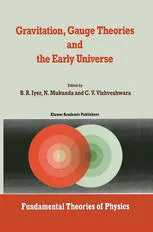Gravitation, Gauge Theories and the Early Universe
4.5
Reviews from our users

You Can Ask your questions from this book's AI after Login
Each download or ask from book AI costs 2 points. To earn more free points, please visit the Points Guide Page and complete some valuable actions.Introduction to Gravitation, Gauge Theories and the Early Universe
The book "Gravitation, Gauge Theories and the Early Universe" offers a comprehensive exploration of modern theoretical physics, delving into the intricate concepts of gravitation, gauge theories, and the fundamental understanding of the early universe. Co-authored and edited by eminent physicists, it provides a meticulous study of some of the deepest questions in physics, making it a cornerstone for anyone interested in cosmology, quantum field theory, and gravitational studies. From addressing Einstein's profound contributions to extending the discussion into quantum gravity and gauge symmetry, this text is a vital resource for both researchers and students wishing to engage with the frontiers of theoretical physics.
Detailed Summary of the Book
The structure of the universe, the interplay of fundamental forces, and the origins of everything we observe in the cosmos are the central themes of this book. Divided into various scholastically rigorous chapters, it begins by laying a foundation in the theory of general relativity, exploring Einstein's genius and the evolution of gravitational theory. It dives deeply into gauge symmetries, which are pivotal in unifying forces in the standard model of particle physics. Furthermore, the book seamlessly connects these theories with the physics of the early universe, elucidating processes such as inflation, Big Bang nucleosynthesis, and the role of quantum fields in shaping the cosmos we observe today.
Another vital focus of the book is creating a bridge between classical and quantum domains. For example, the text richly details efforts to reconcile Einstein's geometric understanding of spacetime with quantum mechanics, highlighting approaches such as string theory and loop quantum gravity. Additionally, the book explores black hole physics, gravitational waves, and recent experimental findings, tying in contemporary research that underscores the dynamic nature of these fields.
Through contributions from multiple experts in the field, the book fosters an interdisciplinary approach, taking readers across the junction of particle physics, gravitation, and cosmology. Whether tackling conceptual frameworks, mathematical rigor, or experimental implications, the text offers a complete and nuanced guide to understanding the fundamental forces that govern us.
Key Takeaways
- A thorough understanding of Einstein's general relativity and its implications for gravitation.
- Insights into gauge theories and their critical role in modern physics and the standard model.
- An exploration of the early universe, including inflation, quantum fields, and their cosmological impacts.
- Discussions on reconciling quantum mechanics with gravitation, emphasizing theoretical advancements like quantum gravity.
- In-depth analysis of black hole physics and gravitational wave science.
Famous Quotes from the Book
“Gravitational theories, though ancient in origin, remain unyielding in their ability to challenge the limits of human understanding.”
“The early universe, a seething cauldron of quantum fields, holds the key to the ultimate union of nature's forces.”
“Gauge symmetry is not just a mathematical abstraction; it is the language in which the universe speaks its fundamental truths.”
Why This Book Matters
In the realm of theoretical physics, few texts manage to capture the depth, breadth, and excitement that "Gravitation, Gauge Theories and the Early Universe" brings to its audience. It is not just a collection of abstract ideas but a carefully framed narrative of how these ideas emerged, evolved, and intersected over time to shape modern physics. The book matters because it inspires curiosity while delivering exacting academic rigor, making it accessible yet challenging for physicists at every level.
Furthermore, as humanity ventures deeper into understanding the universe through ambitious projects such as gravitational wave detectors and particle colliders, this text serves as an invaluable companion. It equips its readers with the tools to appreciate, critique, and extend the cutting-edge research that continues to transform our understanding of the cosmos. For students, researchers, and educators in physics, this book is not merely a reference but a guiding light in the pursuit of profound scientific truths.
Free Direct Download
You Can Download this book after Login
Accessing books through legal platforms and public libraries not only supports the rights of authors and publishers but also contributes to the sustainability of reading culture. Before downloading, please take a moment to consider these options.
Find this book on other platforms:
WorldCat helps you find books in libraries worldwide.
See ratings, reviews, and discussions on Goodreads.
Find and buy rare or used books on AbeBooks.
1209
بازدید4.5
امتیاز50
نظر98%
رضایتReviews:
4.5
Based on 0 users review
"کیفیت چاپ عالی بود، خیلی راضیام"
Questions & Answers
Ask questions about this book or help others by answering
No questions yet. Be the first to ask!


